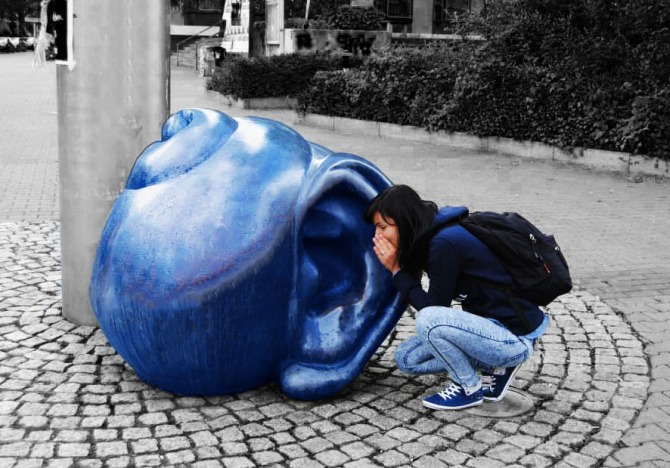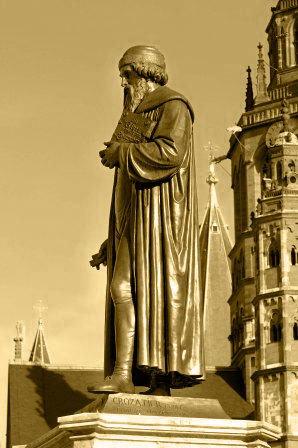
on Gutenberg Universität Campus
“We all are storytellers”, Thomas drank the last sip of his Kupferberg, “we have always been. And life is a tale vaguely based on a real story. But now each and every one of us can have his or her voice heard by an audience”. We left the Kirschgarten and its typically German half-timbered buildings to go to Liebfrauen square, in the proximity of the imposing Mainzer Dom. It wasn’t an ordinary day in the small state capital of Rhineland-Palatinate. On a stage, a group of men in historical costumes was filling a giant wooden barrel with water.
“What are they up to?”, I asked amused. “Every year in June, since 1968 alias the 500th anniversary of the death of Johannes Gutenberg, we celebrate the Johannisnacht in his honor”, was his proud reply. “So you just drown young people to please his dead soul?”, I smiled looking at the curious spectacle. In fact, the men in costume had begun to take one by one the guys on stage and push them into the wooden barrel. While screaming “Tief, tief, tief!” (“deep”), they pushed the poor victims down in the water only to lift them up soon afterwards. And then pushed again and lifted again for an innumerable number of times.

The Gautschen on Liebfrauen Square
“It’s called Gautschen“, Thomas went on explaining, “It’s the baptism of the printer, a tradition that ranges back to the 16th century. The immersion in the water symbolically represents freedom from the sins of the learning years and, well, from lead dust. Nowadays, as you can imagine, the apprentices are mainly media designers who just completed their studies”. “Say hello to the little Gutenbergs!”, I interrupted him waving hands to the stage, where a new troop of drippy designers had assembled and was showing off survival skills.
For some reason, Thomas had always been one of those people who can’t help but organize ideas in a journalistic style. It was just his way of speaking, and, with time and exercise, one could learn to love him in spite of it. Imagine my surprise then, when I suddenly heard him shout “Away from here! The stupid thing is about to have her bath.”, he grabbed my hand and dragged me. “What the hell did I think that I was doing, coming here to see her baptism? Such a sore loser! Dead. She is dead to me. Dead and driving to fucking hell!”. To my astonishment, he had just uttered a period with no great syntactical coherence, and without adverbs or archaisms, not even a latinism in the end to make up for it all. And the expression on his face, as he looked at me, was so fierce that for a second i feared to have thought it aloud. “What’s going on?”, my lips finally moved. “Gutenberg is the inventor of modern times” he replied.

Gutenberg monument at Gutenbergplatz
“If it weren’t for his invention of the printing press, there would have been no Renaissance, no Reformation, no Age of Enlightenment, not even a scientific revolution. In the late 1439, this man made information accessible to the masses, he made books economically viable for printers and readers alike. He was planting in his office the seeds of that mass communication which would for ever alter the structure of society. Ideas could all of a sudden transcend borders, capture common people and challenge the political and religious authorities. Education was never going to be the privilege of some elite groups again, its system not exclusively run by them”. We finally stopped. The stage was not in sight anymore.
“And it all started here”, he went on, “in my city! We were the first to freeze stories in time and make them accessible!”. He paused again, quickly looked at his watch and then continued. “But the new Gutenbergs, you saw them, the ones who have modern technologies and social networks at their disposal, they, we all, are experiencing a revolution much more powerful than the printing press. Everyone can have access to information and give voice to his or her own ideas. Everyone, mainly for free. You don’t need to enter the Hollywood machine if you want millions of people to follow your acting skills. You don’t have to buy Spielberg’s unthinkably expensive equipment to shoot a film which will go around the planet in just a few weeks. You can live in a small village at the end of the world and inspire other souls from around the globe with your photography, paintings, music, stories. As a little star, you can have your own audience!”, his eyes were shining with old dreams.

A glimpse of Mainzer Dom
“And the people who have no other stories to tell but their own, will also have an audience to feed their pride. We all are storytellers. It is in our nature, it’s part of the survival skills. But how can you tell a truth from a lie in the online universe?”, he finally turned and pretended to include me in the conversation. Then went on with the monologue without giving me any actual chance to reply. “Every content we post is mediated. We begin while adding a filter to a photo. We like to filter reality in our struggle for perfection. Then we go on carefully choosing words so that we can trigger the readers’ attention, we choose popular tags and expressions in the attempt at being popular ourselves. And you know what I find really funny?”, he was again only pretending to expect an answer. “It’s the messages in a bottle that I find funny. Those messages we post on the net in the hope that they reach some person we are choosing not to directly communicate with. She should definitely stop trying to communicate with me this way!”.
“She’s a bitch!”, I heard myself saying and soon regretted the brutality of the intervention. He ignored me as usual and came closer. “You need to be careful Kitty”. He liked to call me that way, maintaining that I reminded him of the cat he had as a child. Poor old Kitty. I refused to be nicknamed after a mangy dead cat, and preferred to think it was the Anne Frank side of him addressing me as his most reliable confident. “You shouldn’t trust all the content shared online. There is so much noise there, and you will almost never know if your friend Thomas is really happily traveling around with his beautiful girlfriend as the last uploaded pictures show, or if she is gay, using him as a cover so that her family doesn’t find out”.
I stared at him in shock. “I’m sorry Tom”, was all I could say. And again he ignored me and again he came closer, caressed my hair looking through it as if he was searching for something.

some park, somewhere in Mainz
So I turned away and looked at the blinking cursor. I thought about the readers beginning to empathize with poor Thomas and starting to wonder whether he liked me instead. And in a moment I knew he was right. Online, one cannot tell fiction from reality. And every time we read a post, we know that the information in it might be altered or even completely false. We might realize that it is impossible that everyone has the flawless life he or she is presenting. And yet, we like to trick ourselves into believing in stories. They activate an irrevocable emotional engagement in our brain. They stop the noise, make us develop empathy and look at things from other perspectives. They inspire us, challenge us, bother us. And we need to create them as patterns for orientation, as a way of finding meaning, producing meaning. So what right do I have to tell my readers that Thomas never existed outside the lines of this story? They might well do the job for themselves, as always required with an online post, and decide on their own whether, once upon a Mainz, Thomas and his ideas lived.

I travel a lot in the US but I need to travel more outside. Love this.
LikeLiked by 1 person
thank you for the feedback!
LikeLike
Thanks for the thought-provoking post!
LikeLiked by 1 person
Thank you for the feedback John!
LikeLike
Wonderfully creative! A great way to make a very insightful point. You are very talented.
LikeLiked by 1 person
thank you very much for the supportive words!
LikeLike
Thanks for finding my blog. I find this post intriguing. I am looking forward to reading more of your posts. Lori
LikeLiked by 1 person
Thank you Lori. Next post is coming soon 😉
LikeLiked by 1 person